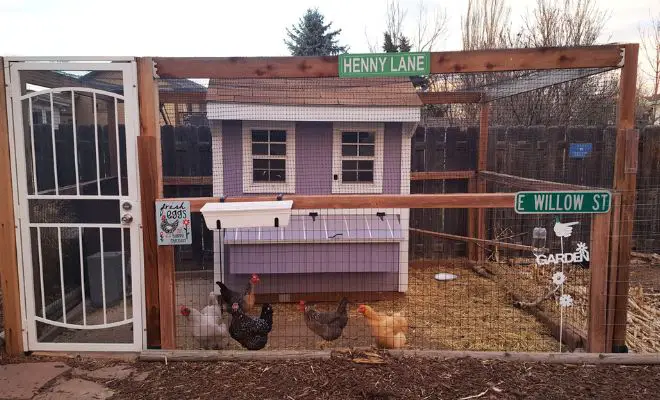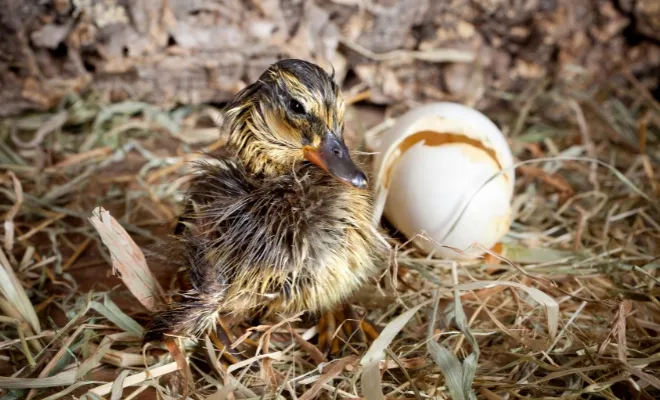Leaving for Vacation? Here’s How You Can Ensure Coop Security!

Taking a vacation should be a time of relaxation, but for backyard chicken owners, it’s something to worry about. That’s where vacation-proof chicken coop comes to mind!
But, how to Vacation-proof the Chicken Coop? Secure your coop with strong fencing, fix weak spots, and consider automatic doors. Stock up with extra food or invest in automatic feeders and waterers. Then, be sure to deep clean the coop before you leave. You can also keep a caretaker or tell the neighbor to look after them (If they’re close enough).
But you need specific planning before you leave your feathered friends. So, here’s a detailed guideline below to teach you what to do when you’re about for a vacation!
Table of Contents
Vacation-proof the Chicken Coop: Can I Leave Them alone for a week?
No, chickens shouldn’t stay for weeks when you’re going for a vacation.
Then, how long can I leave my chickens unattended?
Ideally, adult chickens with a well-equipped and secure coop can be left for 1-2 nights without a problem. Not for weeks! Here are the challenges for a week-long tour –
- There’s a chance of equipment malfunction or running out of supplies.
- Waste builds up quickly, and a dirty coop can become unhealthy for your chickens.
- While a secure coop deters most predators, a week’s absence increases the risks.
- A quick health check-in ensures any potential problems are caught early.
So, here’s a general guideline:
- Short Trips (1-2 nights): With a secure coop and ample food/water, your chickens should be okay.
- Longer Trips (3-4 days): This pushes the limit. Automatic feeders/waterers or a coop sitter are highly recommended.
- Anything longer than 4 days: Having a reliable coop sitter to check on your chickens daily is best.
How Do You Keep Chickens On Vacation? 11 Guidelines!
Ready to go for the holiday trip? Pack up first and prepare the chicken coop just before you leave. Here’s how you can have a safe and stress-free trip leaving the chickens and chicks in the yard.
1. Planning for Poultry
Assess the length of your vacation. Shorter ventures (1-2 days) offer more flexibility than extended adventures.
Create a comprehensive to-do list for coop prep, food, and water needs. Also, clear instructions for your caretaker (If you hire).
2. Coop Security
Make your coop an impenetrable fortress! Reinforce fencing with hardware cloth and address any weak spots that could attract predators.

Consider automatic coop door openers and closers for added security and convenience. Also, check for any potential escape routes and seal them up before you take flight.
Prefer extra layers of defense? Motion sensor lights, and strategically placed fake predator decoys. It also maintains a clean coop with minimal hiding spots.
3. Power Systems
Don’t forget about the importance of a reliable power source!
Consider installing a dedicated circuit for your coop’s electrical needs. It’s crucial for automatic feeders, waterers, and any other essential equipment.
Invest in battery backup systems specifically designed for automatic feeders and waterers.
For a long-term, eco-friendly solution, explore solar power options. A solar panel system with a battery backup can provide a reliable and sustainable power source for your coop.
4. Ensure Cleanliness

Give your coop a deep clean!
Remove old bedding, replace it with fresh materials, and clean feeders and waterers to minimize waste buildup.
Chickens should have 24/7 food and water access. Automatic feeders and waterers are lifesavers for longer trips. For shorter adventures, extra-large feeders and waterers topped up to the brim may suffice.
If you have a coop sitter, ensure they understand the importance of regular coop cleaning.
5. Covered Enclosure for Vacation Coop Comfort
A covered enclosure can safeguard your chicken in many ways. It provides much-needed shade during hot summer days. So, the sun protection is confirmed!
Covering the top of the run with sturdy hardware cloth adds another layer of security. It’s especially against aerial predators like hawks.
A covered run offers some protection from wind, rain, or even snow, depending on your climate.
But what type of cover is right for your chicken? A simple and affordable option, shade cloth allows light and ventilation while blocking harsh sun rays.
You can go for metal roofing that provides excellent protection. But can get quite hot in direct sunlight. Consider adding shade cloth underneath for additional temperature control.
Tarpaulin is another temporary solution for shorter vacations. It’s a good idea for rain protection but may not be very secure against wind or determined predators.
6. Don’t Forget the Dropping Board!
One of the common mistakes while building chicken coops is not putting the dropping board. But a dropping board is literally a lifesaver when you talk about the coop’s cleanliness. Let’s see why you need it.
- It works as an easy manure remover
- Dropping boards can reduce odor and pest control discouraging pests like flies and mites.
7. Choosing the Right Litter for Vacation
For longer vacations, consider the deep litter method. Start with a thick layer of absorbent bedding like wood shavings or chopped straw. As long as the coop stays dry, the litter breaks down naturally.
If you have a coop sitter, add a fresh layer of litter on top of the existing deep litter bedding every few days. This helps control moisture and odor.
8. Egg Collection is Vital

There are two main approaches to chicken egg collection during the vacation.
For very short trips, you can likely leave the eggs in the nesting boxes. Chickens will still lay even if eggs accumulate.
The best option for longer absences is to have a trusted friend or neighbor collect eggs daily. Instruct them on proper handling techniques (gentle, cool, clean hands).
There are some automatic egg collection systems available, but these can be unreliable and may damage eggs. So, I discourage you from applying this idea.
9. Health & Wellness
Consider scheduling a quick vet check-up for your chickens before your trip. It’s especially if you have any concerns about their health.
Provide clear instructions for your caretaker on how to identify signs of illness or injury in your chickens.
10. Communication & Emergency Preparedness
When leaving chickens for vacation, leave detailed instructions, including –
- Feeding and watering schedules
- Coop cleaning routines, and
- Emergency contact information for yourself and a veterinarian.
- Provide your caretaker with ways to reach you in case of emergencies.
Related Article: What Are the Needs of Chickens in Autumn
11. Return & Post-Vacation Care
Upon your return, inspect the coop and check on your chickens. Offer them some familiar treats as a welcome-back gesture.
Give the coop a thorough cleaning post-vacation to remove any waste.
See the following video for additional help to keep chicken coop vacation-proof.
FAQs
Curious to learn more about chicken coops when you’re about to go on a vacation? See the following queries!
Q. Are automatic coop doors safe?
Yes, they offer security and convenience with proper installation and backup power. Choose models with light sensors or timers and consider a secondary latch.
Q. Can I use a regular feeder and waterer for a short vacation?
Maybe for short trips (1-2 nights) with a small flock of feeders/waterers are extra large. Also, it needs to be very secure to prevent tipping/spillage.
Q. My chickens free-range during the day, so how can I keep them safe while I’m gone?
Avoid free-ranging your chickens while away or secure the free-range area with predator-proof fencing connected to the coop run.
Q. What if I can’t afford an automatic coop door?
Consider DIY options using timers and light sensors (requires some technical knowledge). Alternatively, have a coop sitter manually open/close the door.
Q. Are there any alternatives to automatic feeders and waterers?
Yes, for short trips, use larger capacity feeders and waterers filled to the brim. However, this requires a secure coop. Gravity feeders/waterers with larger reservoirs are another option.
Final Word
Preparing your chicken coop for your vacation is crucial to ensure your feathered friends remain safe and healthy. By following the guidelines provided, they’ll be okay when you’re not around. Such as coop security, setting up backup power systems, and maintaining cleanliness.
Remember, even short trips require careful planning and consideration. With these measures in place, you can vacation confidently, knowing your coop is vacation-proofed.






